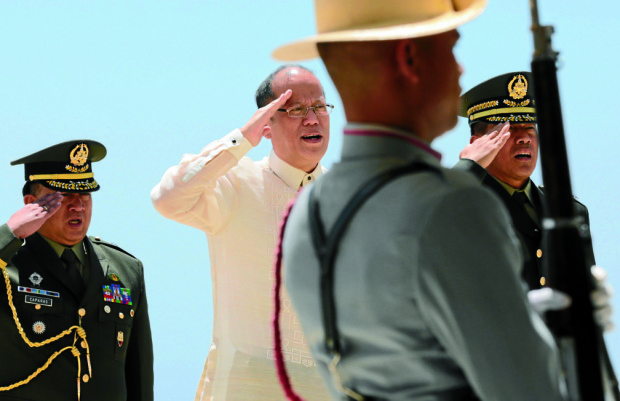The Philippines holds elections on Monday to choose a successor to President Benigno Aquino III. Here are 10 crucial victories and setbacks that came to define his six years in office:
August 23, 2010: Hong Kong hostage crisis
Barely two months in office, Aquino faces his first major crisis when a disgraced policeman takes a busload of Hong Kong tourists hostage.
The gunman and eight hostages are killed in a hail of gunfire hours later in a bungled police rescue operation that deeply embarrasses the young administration and strains ties with the Chinese territory for years.
November 18, 2011: Arroyo arrest
Aquino makes good on a vow to have his predecessor and archrival Gloria Arroyo arrested and stand trial for vote fraud.
When the country’s chief justice, Renato Corona, takes steps to get Arroyo bailed, Aquino allies have him impeached and removed from office. Arroyo remains under house arrest for the rest of Aquino’s term as the trial drags on with little progress.
December 21, 2012: Reproductive health law
Aquino signs a landmark law mandating the state provide free contraceptives to poor couples and teach sex education in schools, defeating years of opposition by the dominant Roman Catholic church.
March 27, 2013: Investment grade
Once regarded as Asia’s basket case, the Philippines wins its first investment-grade credit rating, with Fitch Ratings citing the political and economic reforms implemented under Aquino.
Similar upgrades from Moody’s and Standard and Poor’s follow later that year.
November 8, 2013: Super Typhoon Yolanda (Haiyan)
Yolanda, the strongest typhoon ever recorded to hit land at the time, smashes into the central islands and launches tsunami-like waves that devastate the city of Tacloban.
The typhoon leaves at least 7,350 dead or missing across a swathe of poverty-stricken central islands the size of Portugal.
March 30, 2014: China sea suit
Unable to counter China’s military might as it lays claim to most of the South China Sea, Aquino’s government counters by filing a suit at a UN-linked international arbitration tribunal in the Hague. China refuses to recognize the proceedings.
A ruling on Manila’s bid to have the Chinese claims declared illegal is expected shortly after Aquino stands down.
April 28, 2014: US Defense Accord
In the face of an increasingly assertive China, the Philippines seals an agreement with its main defense ally allowing US troops and equipment to rotate through Philippine military bases in a move designed to bolster the country’s territorial defence.
January 25, 2015: Mamasapano massacre
Elite police commandos raid a remote southern village and kill Malaysian bomb maker Zulkifli bin Hir, who is on a US “terrorist” most wanted hitlist, but the team is ambushed by other Muslim guerrilla groups and militias.
Forty-four soldiers die in what becomes known as the Mamasapano massacre, after the town where the killings occurred. The incident provokes public outrage that eventually derails a peace agreement with the country’s main Muslim rebel group.
February 3, 2016: Peace deal on ice
Angered by the killings of the police commandos, Congress fails to pass a law aimed at creating a Muslim autonomous region in the south of the mainly Catholic nation.
The law had been key to complying with the terms of a 2014 peace deal with the 10,000-strong Moro Islamic Liberation Front, the nation’s biggest Muslim rebel group. The peace process is placed in limbo until the next president takes over.
April 26, 2016: Canadian beheaded
Abu Sayyaf Islamic militants who have pledged allegiance to Islamic State jihadists dump the head of Canadian retiree John Ridsdel on a street on a remote island. Ridsdel was one of four people kidnapped six months earlier from yachts harboured at a luxury marina.
Canadian Prime Minister Justin Trudeau expresses outrage and Aquino vows to “neutralise” the group, which holds other Canadian, Dutch, Indonesian, Malaysian and Filipino hostages. But, as in the past, the militants survive.
RELATED STORIES
Aquino, sisters waited in line to vote in Tarlac
Key facts on Philippine elections
